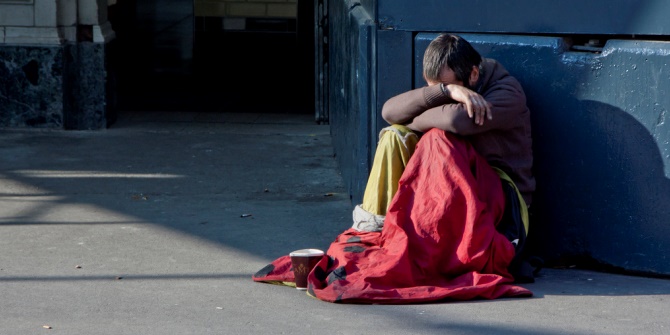 Poverty is just one of a series of issues which combine to place people at the margins of our society. The evidence is unequivocal about the complexity of multiple needs and the scale of policy and practical challenges that it raises. But it is also clear about the right way forward. By focusing on joined up and preventative working, getting the relationships right, and seeing the whole person, we can stop people with complex needs falling through the cracks in service provision, writes Julia Unwin.
Poverty is just one of a series of issues which combine to place people at the margins of our society. The evidence is unequivocal about the complexity of multiple needs and the scale of policy and practical challenges that it raises. But it is also clear about the right way forward. By focusing on joined up and preventative working, getting the relationships right, and seeing the whole person, we can stop people with complex needs falling through the cracks in service provision, writes Julia Unwin.
Poverty is a scar on our nation, but it is neither uniform nor simple to describe. For one group of people – those facing multiple needs – poverty is just one of a series of issues such as homelessness, substance misuse, mental health problems, street activities like begging or prostitution, and experience of institutions such as prisons – which combine to place people at the margins of our society.
At the Joseph Rowntree Foundation we have long been aware of the complex interrelation between these issues. But until recently, the evidence base was weak. Five years ago we launched the Multiple Exclusion Homelessness Research Programme. This aimed to better understand how the issues referenced above related to each other, and, in particular, to the most visible of them – homelessness. The evidence from the programme is unequivocal about the complexity of multiple needs and the scale of the policy and practical challenges that it presents for today’s society.
The research found that nearly half of those interviewed reported experience of institutional care, substance misuse, and street activities (such as begging) as well as homelessness. It also found that using hostels or applying to the council as homeless commonly happen after contact with non-housing agencies (such as mental health or drug agencies, criminal justice system, social services) and also after periods of invisible homelessness such as sofa-surfing, suggesting that homelessness is often the visible end-result of a combined series of systemic failures from other agencies.
Not unexpectedly, the extent of childhood traumatic experiences among street homeless people also stands out in the research; as does the extent of mental health needs and the disproportionate number of homeless men, especially in their thirties, among those with the most complex needs.

The recommendations from the research are worth examining in more detail. First, the report argues, we need to develop a greater focus on prevention, by increasing recognition of the childhood experiences that lead to multiple needs. There is a pressing need for the wider system as a whole to understand the routes into multiple exclusion and the critical intervention points for prevention, with key services such as mental health, substance misuse and social care working together to prevent people slipping into deep exclusion. Public spending contraction combined with demographic change and declining living standards have made this task both harder and more urgent.
Secondly, the importance of getting the relationships right: relationships between people and their family and friends; between people who use and who deliver services; between practitioners working in the same and in different sectors. The Multiple Exclusion Homelessness report recommends more reflective practice within services; better joint working so that agencies work in partnership rather than in parallel to each other; recognising and developing the role of cross-sector coordinators who can mentor and advocate for individuals; and helping professionals to learn and share from each other. It also points to need to bring positive social networks and relationships into the core of an individual’s recovery.
Thirdly, we need to learn to create services that recognise the whole person: we all have a past and a future as well as a present. In particular, the research suggests that as a society we must learn how to support the large proportion of people whose multiple needs stem from childhood sexual abuse, as little attention has been given to creating a support system to assist people – especially men – through such trauma.
All welfare systems have conditions attached to them. But a socially just system of conditionality requires clear communication of conditions, and reasonable application of reasonable sanctions. Sanctions should be a last resort only, and should surely never result in destitution that removal of all or even a moderate percentage of income would entail. Yet stories are beginning to emerge of short-term destitution, and warnings are being sounded by frontline voluntary, community and faith groups of the harmful and counter-productive effects that harsher sanctions may have. I suspect we may find similar over-representation of men in their twenties and thirties, with complex needs, experience of multiple exclusions and traumatic pasts, among this number. What are the risks that some of them will fall out (drop out or opt out) of the social security system entirely?
As our labour market becomes ever more ‘hour-glass’ shaped, characterised by a business model premised on insecure, low-paid, low-skilled jobs with limited opportunities for progression – so we see more evidence of a ‘continuum’ of labour exploitation. The experience of forced labour is at the extreme end of that spectrum, and JRF-funded research suggests that the numbers in forced labour in the UK may run into several thousand. But the broader issue is one of insecure ‘zero hour’ contracts, which fail to make work pay and draw growing numbers into work-based poverty.
As I write, my fear is that we are entering a decade where we witness the re-emergence of destitution in the UK, and that the ‘faces’ of destitution will be more diverse than in the past – from migrant women whose status means they have ‘no recourse to public funds’, to single young men leaving care with mental health problems and no qualifications, to fearful workers exploited for their labour and with no idea where to turn for help.
There has never been a more important time to highlight the challenges of multiple needs in the UK, to shine a light on the hardest to reach, and to develop a new welfare settlement that aims to reduce multiple disadvantage rather than accept it as a by-product of the current rush to growth.
A version of this article was originally published in the Fabian Society pamphlet Within Reach: The new politics of multiple needs and exclusions.
Note: This article gives the views of the authors, and not the position of the British Politics and Policy blog, nor of the London School of Economics. Please read our comments policy before posting.
About the Author
 Julia Unwin is Chief Executive of the Joseph Rowntree Foundation and the Joseph Rowntree Housing Trust. She was a member of the Housing Corporation Board for 10 years and a Charity Commissioner from 1998-2003. Julia was also Deputy Chair of the Food Standards Agency and worked as an independent consultant operating within government and the voluntary and corporate sectors. She previously held a position as chair of the Refugee Council from 1995 until 1998, and is currently a member of the University of York’s Council. Julia has written several books, the most recent of which is entitled “Why Fight Poverty?” and was published in November 2013. She tweets at @juliaunwin
Julia Unwin is Chief Executive of the Joseph Rowntree Foundation and the Joseph Rowntree Housing Trust. She was a member of the Housing Corporation Board for 10 years and a Charity Commissioner from 1998-2003. Julia was also Deputy Chair of the Food Standards Agency and worked as an independent consultant operating within government and the voluntary and corporate sectors. She previously held a position as chair of the Refugee Council from 1995 until 1998, and is currently a member of the University of York’s Council. Julia has written several books, the most recent of which is entitled “Why Fight Poverty?” and was published in November 2013. She tweets at @juliaunwin







Excellent article, agree with it overall and there are many important points. Too tired mentally to comment coherently, suffer from many things and a major factor in this is extreme fatigue and loss of concentration. I firmly believe that bad as the past 4 years have been for many disabled, poorer & vulnerable people (I sadly come in to this somewhere& see no way out), lay the blame for this solely at the foot of the Condem Government, that it will get even worse, beyond belief.
64,000 thousand dollar question is, what can be done and are enough groups and people like yourself really doing all you can? There has to be much more that can be done, otherwise all the hard work that has been done over last few decades will come tumbling down and I really think as a country/society, we won’t recover? Look how long the effects of what Thatcher did were felt, the house building alone has never recovered, after the sell off of council properties.